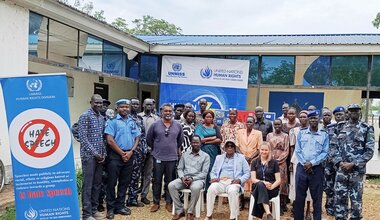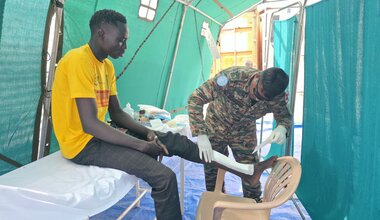Access denials to conflict-affected Wonduruba and other hotspots puts civilian lives at risk
Early morning at the United Nations Mission in South Sudan’s base in the capital Juba, peacekeepers are gearing up for a patrol to a notoriously unsafe area where civilians, including women and children, have been killed and displaced.
The peacekeeping convoy snakes its way southward through the city towards conflict-affected Wonduruba, in Central Equatoria State. The 122-kilometer drive should take just two hours, but the treacherous terrain, with heavily flooded and damaged roads, forces the convoy to travel for more than seven hours.
The peacekeepers camp out on the roadside overnight, sleeping in a hastily erected tent and cooking a simple meal in metal pots over charcoal fires. In the morning, they continue. But just five kilometers from Lainya, the patrol is stopped at a checkpoint. Despite intensive negotiations, they are forced to turn back by security forces.
“We try our best when we reach the checkpoints not to aggravate the situation and not to get into a conflict, but what suffers is our ability to reach locations where we can save lives of South Sudanese citizens,” says UNMISS Force Commander, Lieutenant-General Mohan Subramanian. “Access denials prevent us from saving those lives.”
While a South Sudanese delegation is now investigating the violence in Wonduruba, UNMISS and other organizations charged with monitoring, preventing and responding to conflict have been denied access since April 2024. It is an example of a worrying trend in preventing UN peacekeepers reaching and protecting people in hotspots.
Most of the 700 Force patrols conducted by UNMISS every month take place unhindered, but UNMISS is repeatedly refused access in a few cases.
“On the face of it, the numbers may look insignificant, but these are the locations where clashes are imminent. These are the places we have the most concern about protection of civilians,” says Lieutenant-General Mohan Subramanian. “If we are not able to get there and show our presence, we cannot prevent the conflict escalating.”
“The Government is primarily responsible for protection of civilians. If their armed forces can reach that place and prevent the conflict, we are more than happy. But if they can’t reach places and conflict is not being prevented, we must go,” he says.
“Although access may only be denied for 15 patrols a month, maybe two to three percent of our overall patrols, it can cripple the implementation of our protection of civilians mandate.”
Maintaining a strong and positive relationship with the host government and security services is vital for UNMISS. But so is keeping the trust and confidence of the communities the mission serves, as it supports peace efforts, facilitates safe delivery of humanitarian aid to millions in need, investigates and reports on human rights violations, and works to prevent a relapse into widespread conflict.
“We request the government that, one of the best ways to ensure collectively fulfil the protection of civilians mandate, is to ensure unfettered access to UNMISS. We have never, ever gone against the interests of peace in South Sudan and there is no reason to feel that UNMISS going anywhere will create any difficulty for the government or the peace agreement. It will actually promote our efforts in this regard.”
 UN
UN United Nations Peacekeeping
United Nations Peacekeeping





